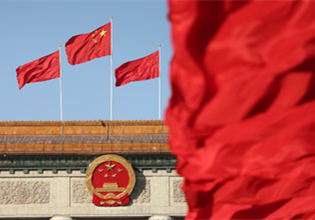Tourism boosts incomes for Ewenkis
Holding a small, round piece of cowhide in her left hand, Uran used her other hand to meticulously stitch a pinch of white wool evenly to its edge.
After a series of procedures, a piece of traditional Ewenki handicraft called "sun flower" was created, with the cowhide in the center representing the sun and the wool around it symbolizing rays of light.
Uran, a 55-year-old member of the Ewenki ethnic group, runs a traditional handicraft workshop in Ewenki Autonomous Banner in the city of Hulunbuir, Inner Mongolia autonomous region.
The ice and snow that blanket the region during winter — as well as China's 14th National Winter Games — have drawn tourists to the city, and the traditional Ewenki handicraft has become a popular souvenir, earning income for the locals.
Uran said the sun flower handicraft, a regional-level intangible cultural heritage, comes from an Ewenki folk tale, representing the Ewenki ancestors living in the forest yearning for warmth and light.
"Now, the handmade accessory is loved by many tourists at home and abroad as fashionable gifts," she said.
Figures show the city received more than 1.6 million tourists during the Lunar New Year holiday, nine times more than the same period last year, and tourism revenue skyrocketed to 1.14 billion yuan ($160 million), 10 times higher than the 2023 period.
Aijim, Uran's daughter who helps run the workshop, said some tourist resorts, museums and exhibition halls have placed orders with their workshop for souvenirs, with some requesting customized designs.
She said business revenue has exceeded 50,000 yuan since the Lunar New Year.
The workshop employs 26 full-time workers and 30 part-time workers. Part-time workers earn more than 2,000 yuan a month on average, and can make as much as 5,000 yuan, depending on the quantity and quality of their work.
Since its establishment nine years ago, the workshop has helped 12 workers shake off poverty while also offering free handicraft skills training to more than 1,000 locals.
"My mother and I believe it's equally important to develop our workshop and bring fortune to our neighborhood," Aijim said.
Their workshop is located in an ethnic cultural startup park built in 2016 in the banner to encourage entrepreneurship and develop Chinese traditional culture. To date, the park has attracted nearly 300 businesses. To woo young customers, Aijim has developed new products, including refrigerator magnets and mouse pads, and has advertised them online.
Last year alone, the workshop sold some 60,000 handicraft items, raking in a record high revenue of more than 800,000 yuan. The range of customers has expanded to Guangdong province, Fujian province and other places. "I hope our sun flower accessories can be sold to more places," Aijim said.



 Print
Print Mail
Mail





